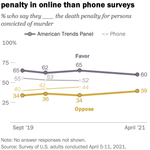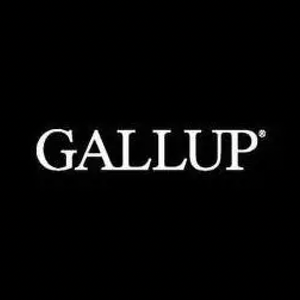
A new poll by the Pew Research Center reports that support for the death penalty is down in the United States but may be higher than previous estimates because some poll respondents are unwilling to admit to a live pollster that they support capital punishment.
Results of Pew’s April 5 – 11, 2021 on-line survey of U.S. adults, released on June 2, indicated that 60% of respondents said they favored the death penalty for persons convicted of murder, down from the 65% level of support reported by on-line respondents in August 2020 and September 2019. In a phone survey over what Pew said was “a nearly identical period” in August 2020, 52% of adults said that they favored the death penalty.
Pew found that during the last three times in which it surveyed Americans about their views on the death penalty, on-line respondents were 9 – 12 percentage points more likely to say they favored capital punishment than were respondents who provided responses to a live interviewer on the phone. Pew said that “survey questions that ask about sensitive or controversial topics — and views of the death penalty may be one such topic — may be more likely to elicit different responses across modes.” That difference, it posited, is “perhaps attributable to social desirability bias.”
Courtney Kennedy, Pew’s director of survey research, told the New York Times the researchers were “absolutely” convinced that social desirability bias was the most significant factor in the differences between the responses to the on-line and phone surveys. The death penalty, Kennedy said, is “a bit of a touchy subject, it’s kind of sensitive, and admitting that you hold an opinion that has such profound implications for somebody else — not everybody wants to engage with that with a stranger.”
Because of this, Pew has shifted its methodology in death-penalty polling from phone interviews to on-line surveying. However, it said, telephone surveys continue to “provide a basis for examining long-term changes in the public’s attitudes toward the death penalty.” Those surveys, Pew noted, “have shown a steady decline in support for the death penalty in the United States since the mid-1990s.”
The April 2021 on-line survey found that 60% of respondents said that they favored the death penalty, while 39% said they opposed it. Opposition to capital punishment grew by five percentage points compared to on-line surveys taken in August 2020 and September 2019. Strikingly, however, a majority of respondents reported significant problems in the way the death penalty is administered. Although 64% of respondents thought “the death penalty is morally justified” when a person “commits a crime like murder,” most respondents —a nearly four-to-one margin — reported that the death penalty risks executing the innocent. 78% of respondents told Pew that “[t]here is some risk that an innocent person will be put to death,” while only 21% responded that “[t] here are adequate safeguards to ensure that no innocent person will be put to death.” “Only 30% of death penalty supporters — and just 6% of opponents — say adequate safeguards exist to prevent innocent people from being executed,” Pew said.
Respondents also disagreed with the notion that capital punishment contributes to public safety. 63% of on-line respondents told Pew that “the death penalty does not deter people from committing serious crimes,” compared to 35% who said they believed the death penalty was a deterrent. A majority of U.S. adults surveyed (56%) also said that “Black people are more likely than White people to be sentenced to death for committing similar crimes.” 41% said that “White people and Black people are equally likely” to receive the death penalty for similar crimes. The results reflected significantly different worldviews on this issue depending upon a respondent’s race. 85% of Black adults responded that Black people are more likely than Whites to be sentenced to death for similar crimes, falling to 61% of Hispanic adults and 49% of White adults.
The poll found significant differences in views of the death penalty based upon respondents’ race, age, education, and political affiliation. 64% of Whites and Asians said they supported the death penalty, compared to 56% of Hispanics and 49% of Blacks. Support for capital punishment was highest among adults aged 50 – 64 (69%), falling to 60% among those over 65, 58% among those aged 30 – 49, and 51% among those aged 18 – 29.
Whether respondents favored or opposed the death penalty was inversely related to their level of education. Those with a high school education or less were most likely to favor the death penalty (68%), dropping to 63% among those with some college education, 49% among college graduates, and 44% among those with postgraduate education.
77% of Republicans — and 82% of Republicans who identified themselves as conservative —said they favored the death penalty, with 23% and 17%, respectively, saying they opposed it. 53% of Democrats — and 64% of those identifying themselves as liberal — said they opposed the death penalty, versus 46% and 36%, respectively, who said they favor it.
Andrew Daniller and Jocelyn Kiley, Death penalty draws more Americans’ support online than in telephone surveys, Pew Research Center, June 2, 2021; Giovanni Russonello, How Many Americans Support the Death Penalty? Depends How You Ask., New York Times, June 2, 2021; Most Americans Favor the Death Penalty Despite Concerns About Its Administration, Pew Research Center, June 2, 2021; Palash Ghosh, Support For Death Penalty Slips In U.S., But Remains High Among Whites And Republicans, Forbes, June 3, 2021
Download the Pew Research Center report and analysis of the poll and its topline questionnaire.
Public Opinion
Jul 26, 2023

NEW RESOURCES: Capital Punishment and the State of Criminal Justice 2023
Public Opinion
Nov 15, 2022
